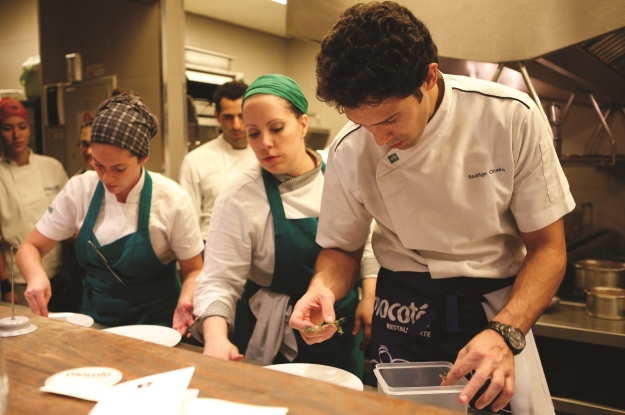See the rest of the AQ Top 5
As ridiculous as it may sound, São Paulo’s moneyed elite historically shunned “Brazilian” restaurants. Fine dining meant French, Portuguese, Japanese, or anything else foreign — reflecting both the city’s immigrant-heavy background and its prized self-image as distinct from the rest of Brazil. That finally began to change over the last decade as D.O.M., Mani and other chic restaurants in the financial district mixed exotic ingredients from the Amazon and the Northeast, winning over locals and foreign food critics alike.
But if paying $50 for a home-style pork chop isn’t your thing, there is another option — and arguably a better one. Mocotó sits on the city’s northern edge about 10 miles away from its pricier peers, but it has become just as big a mecca for paulistano foodies, who begin lining up an hour before opening. And the prices are perfectly in line with working-class fare — which is exactly what Mocotó serves.
“We find value in things that cost very little,” Rodrigo Oliveira, the chef behind Mocotó, told AQ. That philosophy has its roots in the northeastern sertão, Brazil’s driest and poorest region and also the ancestral home of Oliveira’s family. “People there learn to get the maximum benefit out of everything — whether it’s chicken, fruit or beans. It’s part of the culture; you never know when the next drought will come.”
“For example,” he continued, “I happen to think pork belly is better than rack of lamb. But it needs more preparation. You have to dedicate the time.”
Speaking of underappreciated ingredients, the restaurant’s name means “cow’s hoof”— which is the gelatinous base for its signature soup. Other highlights include mandioca chips, sun-dried meat and good, old-fashioned rice and beans.
Reasonable prices have been especially important during Brazil’s current economic crisis. Oliveira, 35, said a few of Mocotó’s suppliers have closed down, but business remains strong. “We have TV personalities, workers from the neighborhood, and bankers who cross the city to eat here,” he said. “Being inclusive is very important.”
—
Winter is the editor-in-chief of AQ.





